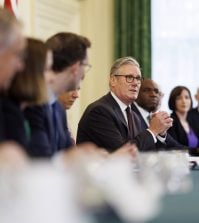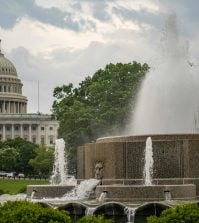Can new prime minister Rishi Sunak bring stability to UK?

Upheaval caused by the resignations of two UK prime ministers and scores of ministers within a matter of weeks has left civil servants struggling to deliver policies with “morale at rock bottom”, according to government staff and union bosses.
It is hoped that today’s announcement of a new prime minister will offer some stability for government staff and the country-at-large after weeks of turmoil. Rishi Sunak, who had been chancellor under Boris Johnson, won the leadership bid to become Conservative Party leader and PM, having been the only contender to have been backed by more than 100 MPs. It was his second attempt to head government after losing to Liz Truss last month.
Prior to the announcement, one employee at the Department for Work and Pensions (DWP) said government departments were “frightened to implement what they think was previously agreed because they don’t know if it’s still ok”. Speaking anonymously to the Big Issue magazine, they added that staff are “absolutely incapable of going and asking anyone for more funding or whether or not they’ve got a long-term strategy” and that “the machinery of government is coming to a grinding halt”.
Mark Serwotka, the boss of the PCS union, which represents 150,000 civil servants, said that “the lack of continuity and chaos is certainly disrupting the running of the government”.
“When incompetent politicians flail around changing policies on the hoof, failing to deliver, it’s our members who take the flak on the frontline,” he told the Big Issue last week.
Truss’s short stint
Truss resigned on Thursday after just 45 days as prime minister following a tumultuous few weeks in which she announced economic policies that caused investor confidence and the value of the pound to plummet, prompting her to make a number of U-turns and sack chancellor Kwasi Kwarteng. She became PM on 6 September but was forced to resign last week after a chaotic vote on fracking, during which it is alleged Tory MPs were bullied and harassed by senior party figures while queuing to vote in the House of Commons, causing the chief whip – party manager – to resign before deciding to stay in post.
Read more: UK government bids to halt financial turmoil after botched tax cuts
The home secretary Suella Braverman also resigned during Truss’s tenure. Though this was for breaking the ministerial code over the use of a private email account for work purposes, Braverman slammed the government’s performance in her resignation letter.
Combined, these events led to a growing revolt among MPs, making Truss’s leadership untenable. She is the shortest serving PM in British history. The previous PM Boris Johnson announced on 7 July that he would step down as PM after a series of scandals, including revelations that he had attended parties at Downing Street when COVID-19 restrictions were in place. Then chancellor Sunak had been one of the first of around 60 ministers to resign from Johnson’s government.
News of Sunak’s successful leadership bid means there have been three prime ministers, four chancellors and three home secretaries in four months, with further changes when the new cabinet is announced in the coming days.
Will Sunak’s government mend relations with the civil service?
On top of the disruption caused by recent events in government, the civil service has also had to contend with the threat of widespread job cuts announced by Johnson in May. The plan was to cut around 91,000 jobs by 2025, in a bid to shrink the workforce back to 2016 levels.
Read more: UK PM backpedals on plans to cut 91,000 civil service jobs by 2025
“When we’re talking to our management about staffing levels, redundancy packages… they don’t know. You’re trying to get answers to what should be pretty straight forward questions, and they can’t tell you,” the DWP employee said. “Morale is at rock bottom… Staff themselves across every government department have got this cull hanging over us, we’re asking: ‘Will I be part of this big cull? Will there even be a big cull?’.”
All eyes will be on Sunak to see whether he adopts or drops the existing job cuts plan and can mend strained relations with the civil service caused by news of the planned cull; pay disputes; claims that ministers have been more-readily ignoring policy advice from senior civil servants in recent months; and Truss’s decision to sack the widely-respected Treasury chief Tom Scholar on her first day in office.
Steven Littlewood, assistant general secretary of the FDA union, said such treatment had made “many dedicated and long serving staff wondering if it’s worth it.”
A government spokesperson said: “We are incredibly grateful to the civil service for the outstanding job they have done and are continuing to do in serving the public. Ministers and departments across government will continue to deliver for the people that they serve.”
However, they are likely to have to do so with fewer resources. Against a backdrop of the price of government borrowing having soared in recent weeks and the Treasury scrambling to fill the hole in the government’s finances, Sunak is expected to introduce public spending cuts in order to balance the books.
Strike action on the cards over pay
PCS is currently balloting its members on strike action over pay, pensions and redundancy terms. Serwotka described the vote – which comes after the government rejected the union’s demand for a 10% pay rise, a 2% cut in pensions contributions, and a £15-per-hour minimum wage – as the “most significant ballot for strike action” in the union’s 24-year history.
At present, civil service pay rises range up to 3%, with departments able to make average increases up to 2%, and a further 1% rise if they can demonstrate the pay would address specific priorities in the workforce. The PCS said this amounts to a 10% real-terms pay cut, and that some of its members are having to claim the benefits they administer and skip meals or resort to food banks because they can’t afford food.
In May 2022, a PCS poll of its members found that 81% were willing to take industrial action. The result of the ballot is expected to be announced on 10 November.






















